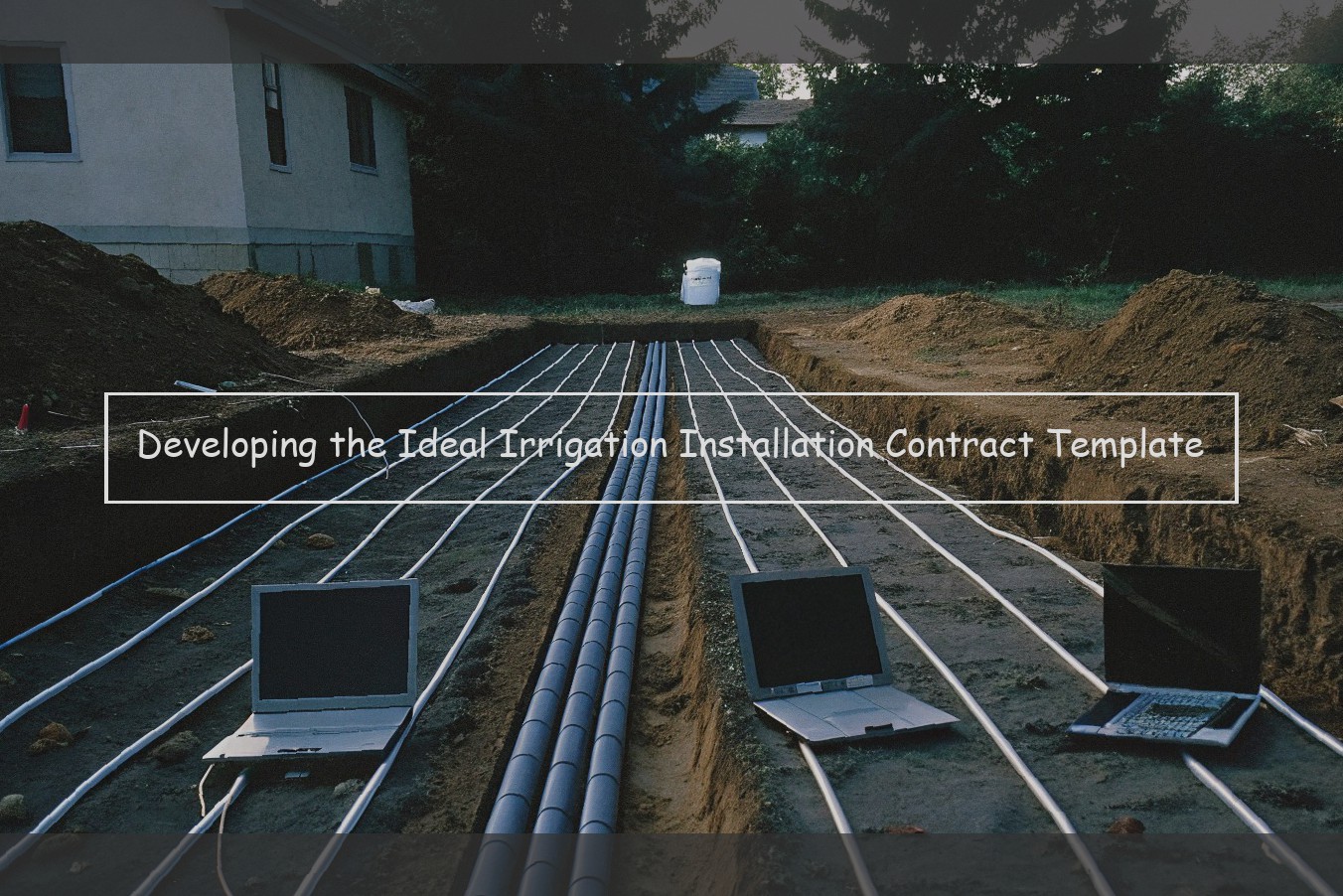
The Value of Your Irrigation Contract
Regardless of the size and scope of your irrigation installation project, you should always have a well-written contract with the client. Since irrigation systems, sometimes referred to as water systems, are designed and built to the specifications of the client, every contract must be tailored to the specific conditions of the given job. A basic irrigation system forms a complicated infrastructure of pressurized pipes, pumps, valves, drains, sprinklers and a host of additional components. A contract detailing how much the client is expected to pay for the entire job is a necessity. Otherwise, the labour hours, materials and hours on the job become difficult to properly verify, and excessive costs become a point of contention between the clients and contractors . By clearly stating what they must pay for and the work that is included, a well-articulated contract protects both the clients and contractors.
Clients appreciate that the contract: Contractors value the contract because it means: All projects, whether residential or commercial, are subject to inspection by the owner’s insurer. Therefore, it is in the contractor and the client’s interest to have a clear list of conditions that each party must follow. The most important of these is that full payment for services rendered is made only when the entire project is done. Keeping the project compartmentalized will help resolve differences in a timely manner.
Essential Components of an Irrigation Contract Template
An irrigation installation contract template should be a detailed representation of both the scope of work and pricing. Do not leave anything unclear that can be easily stated on the front end. After all in a dispute it is going to be extremely difficult to prove any oral promises or representations by either party. Having a professional contract or template, explains how much the work will cost, and what kind of changes to the work are allowable. Any good irrigation installation contract template will have change order provisions, and provide for progress payments and retainage.
Every good contract should set out the scope of the work, how long the work is to take and the date by which the work is to be completed. The best irrigation installation contract templates always provide for the completion date and a remedy if that date is missed. Keep in mind in this instance, proving damages will be extremely difficult, but providing a contract remedy for the missed date is a good idea.
In addition every good irrigation installation contract template will set out the remedy for defective work. Typical contract language includes alternatives such as correction of the defective work or removing the non-conforming work, generally at the cost of the irrigation installer. In addition the contract should provide for an industry warranty and a limit on that warranty, such as one year, or maybe even a four-year statute of repose.
A good irrigation installation contract template will also provide for endorsements and certificates from insurance carriers. Be sure to include in the template a provision that states that the irrigation installer is required to provide a certificate of insurance upon request and before starting work. A provision in the irrigation installation contract template that the certificate of insurance must provide thirty days advanced notice is also a good idea.
Change orders are a necessary part of any construction project. A good contract template will provide for change orders by both parties, by a written, signed document. It is a good idea to require that all change orders be signed by the property owner, as well as the irrigation installer.
Legal Implications for Irrigation Contracts
When developing the template for your irrigation installation contract, several legal issues must be taken into consideration, even if you are not a lawyer. Right up front, will the contract be in compliance with local law? If your work requires you to pull permits and/or get approvals from planning commission, zoning board or hazard mitigation practices, you want to make sure that you have included those mandatory requirements into your contract.
In addition, contracts should contain disclaimers of liability, especially for any potential damage your client may suffer as a result of your work. If your company does damage to your clients property, the Oklahoma judge decided the contract made it clear it was not liable for the additional damages. Today, your contracts should contain such liability disclaimers or limitations, especially when it involves a project that has some risk associated with flooding or other water issues.
Next you should consider the enforceability of the contract. A written contract is generally enforceable in court if it is signed by both parties and contains all essential elements of a contract: an offer, acceptance, and a promise to do something (or not do something) for a payment or some other consideration. Because of certain laws, statutes and case rulings, the way an offer is made or accepted can sometimes be very tricky.
Tailoring Your Template to Fit
The simple irrigation installation contract template is just a starting point for your business. When it comes to the unique demands of any particular project, you have to be able to customize your documents to reflect that reality. For instance, the residential landscape setup project is going to be much different than a massive commercial installation and your contract would be expected to reflect that.
Additional clauses or terms might be needed in certain instances and you will need to have a basic understanding of how to add these to the contract template to fit your needs.
For example, you may have a larger project specified reimbursement of expenses including mileage. You might like to have this reflected in your contract with a clause like this:
Additional Mileage Reimbursement: The client shall reimburse the contractor for any mileage or transportation expenses incurred as part of the job. These expenses shall be:. If no method for reimbursement is specified here, the contractor shall not be permitted to collect any additional compensation for travel or mileage expenses.
It’s also important to realize that the original language of the agreement may not be a necessity in every case. These can be changed by the creator or designee at any time. Verbiage about parties or contracted items can be augmented or adjusted.
Sometimes additional restrictions or conditions might be added to the basic contract template. One example might be a clause specifying that materials used must reflect the quality and durability of approved samples. Here is an example:
Contractor Agreement Regarding Quality and Durability of Materials: The contractor shall use materials of the same quality and durability as those found in approved samples. All materials must be approved before being installed at the job site. Genuineness and quality will be stored so that the client has confidence in the contractor’s abilities to provide excellent service.
The Seven Deadly Sins: What NOT to Do
Common mistakes when drafting irrigation contracts include: 1) using an old contract form, 2) simply modifying an old contract form, 3) no formal bidding process before contractor selection, 4) not specifying minimum standards, 5) failure to define key terms with specificity so that they are subject to different interpretations and 6) having ambiguous performance standards. For a contractor to sue a client for nonpayment, there must be evidence of the legal right to payment— usually that is satisfied by a contract. The importance of the contract cannot be overstated.
Using an old contract form that does not reflect changing laws, court decisions and changes in the business model from what it used to be can result in problems and potential disputes.
Simply modifying an old contract form without thoroughly reviewing it to reflect current issues and laws may result in an incomplete or inaccurate contract. If an issue arises that is not covered by the modified old contract, then there may be no way to resolve the problem. This can lead to disputes, litigation and ultimately worse problems.
Not using some form of bid process can result in a contractor being next in line for the job after the owner of the property talks to some contractors about the project. Once that happens and the contractor goes out on the property, makes some measurements and submits a bid for the project, it is critical to have the bid take the form of an agreement at the same time . If that is not done, and the property owner decides to hire a handyman who goes out and does basically what was proposed by the contractor, that can put the contractor in the position of having little or no claim for payment. The owner may claim the handyman did just what the contractor suggested.
Minimum standards should be spelled out in the contract. For example, turf height, turf quality and quality of materials should be specified in the contract. If these standards are not met, then there may be no way to obtain damages for remediation if the contract does not expressly set forth these requirements.
Failure to define key terms in the agreement can be problematic in that they can have different meanings and interpretations. For example, what is the meaning of commercial landscape maintenance? Is a bare spot in the grass a maintenance issue or an installation issue? These issues should all be reviewed and completely worked out before sending a contractor out to do the work and paying the contractor.
Ambiguous performance standards in the contract could give rise to different levels of expectation and performance. Performance standards should be explicit. For example, if the contract is for irrigation service, it should clearly state by what date the service must be completed or by what date during the year the contract service must be performed. It should also specify whether the service must be performed by a specific individual or just someone who works for the service provider.
Leveraging Software for Contract Management
The use of modern technology for contract management can streamline the process of creating, signing, and managing the irrigation installation contract. Digital tools can reduce human error and allow installers to focus on carrying out the terms of the contract rather than navigating bandwidth-hogging, server-intensive, web applications that attempt to do the same work that can easily be accomplished with tools already installed on a Mobile phone or PC.
Contract templates can now be created using free online software or Word processors and form filled out digitally. It is always a good idea to go through the free online templates and contract generators and identify the forms that work best for you in terms of ease of use and output. The process of creating a template and using it to create a contract can save a lot of time. Contracts can then be signed digitally using software, which provides provable, and time-stamped signature verification of the parties. The active contract can be stored in the cloud for easy access later (be sure it has not been altered).
Modern contract management software, which can be purchased or leased on an annual subscription basis, can streamline the process of reviewing contracts. The software will provide a standardized contract and templated variables which can be used to automatically complete the contract. Certain fields, such as the job price, may need to be indexed according to local guidelines, or be subjected to overwriting rules such as pricing above or below a book. This sort of structure can help to ensure that the contract contains a written price and only eliminates the possibility of errors later when the contract is viewed or printed.
Irrigation Installation Contract FAQs
Frequently Asked Questions About Irrigation Contracts
What types of irrigation contracts are available?
While there are different ways to structure an irrigation contract, they generally take one of the following forms:
What are the key elements of an irrigation contract?
A well-written irrigation contract should include the following elements:
What is a change order?
Contracts are not always perfect when you sign them – especially those that involve construction work. As a result, most contracts include a change order that allows you and the irrigation contractor to modify the contract. Rewrite the contract to reflect any new requirements , or simply use any other method that you and the contractor agree on, such as giving each other verbal instructions. Just remember that if the change order shows an increase in the contract price, it typically must be in writing to be enforceable.
Should I require the contractor to be licensed and insured?
You should always make sure that your irrigation contractor is licensed, bonded, and insured. In many states, this is a legal requirement. If your state does not require contractors to be insured, we recommend that you require all contractors working on your property to maintain liability insurance.



